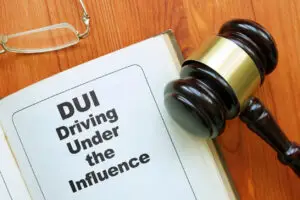DUI, three letters, one big consequence. In many cases, it ends with a frustrated driver dealing with the consequences of drinking and driving. While the severity of DUI accidents will vary widely, a DUI can potentially escalate into a felony offense. These violations carry far more serious legal and personal consequences. As California law treats those cases with particular severity, the outcome can change a driver’s life.
So, what is a felony DUI? And how does it differ from a standard DUI? The answer lies in how California defines and treats these cases.
What is a DUI?

DUI, or otherwise known as ‘driving under the influence’, is referred to as the act of operating a vehicle while under the influence of drugs or alcohol. Most DUI charges are prosecuted when someone is caught driving while intoxicated. Under California Vehicle Code 23153, it is illegal for anyone to drive a vehicle while under the influence of any alcoholic beverage or drug. First-time offenders or even repeat offenders, will get fined, jailed, or have their license suspended.
What Are the Penalties for a DUI in California?
California law makes it clear that DUIs carry severe penalties, especially for repeated offenses. While the severity of a DUI accident can possibly affect the number of issued penalties, state law outlines a series of fines and punishments based on prior violations.
-
- First DUI: Under Vehicle Code 23536 (a), a first conviction carries 96 hours to 6 months in county jail, fines between $390 and $1,000, and a 6-month license suspension.
- Second DUI: Under Vehicle Code 23540 (a), a second offense within 10 years results in 90 days to 1 year in county jail, similar fines, and license suspension.
- Third DUI: Under Vehicle Code 23546, penalties include 120 days to 1 year in county jail, fines, and a three-year license revocation.
To some people’s surprise, California law treats first and second violations as misdemeanors. But this raises the question many drivers have: what is a felony DUI, and when does a charge cross that line?
When Does it Become a Felony DUI?

For drivers wondering what is a felony DUI under California law, the answer often comes down to two factors: either causing injury or death during the accident or committing a fourth offense within 10 years. Additionally, California takes repeat offenses more seriously, and the penalties grow harsher for each DUI charge. This especially applies for drivers who have been previously charged with prior felonies.
At this stage, the consequences go beyond fines or temporary suspensions. In fact, felony DUI convictions usually mean state prison sentences, extended license revocations, and a permanent criminal record. This can cost you your freedom, your driving privileges, and long-term opportunities in employment, housing, and insurance.
Why Felony DUI Laws Matter

A felony DUI is more than just another traffic violation. It carries serious, long-term consequences. In California, the difference between a misdemeanor and a felony often comes down to repeat offenses or causing injury while impaired. Knowing what a felony DUI is and how the law treats it can make all the difference in avoiding mistakes that could affect your future.
If you ever find yourself facing a DUI charge, the most important step is to take it seriously. Learn your rights, follow court requirements, and seek professional guidance when needed. Knowing what a felony DUI means for your future can help you stay informed, proactive, and better prepared to handle the challenges ahead.
